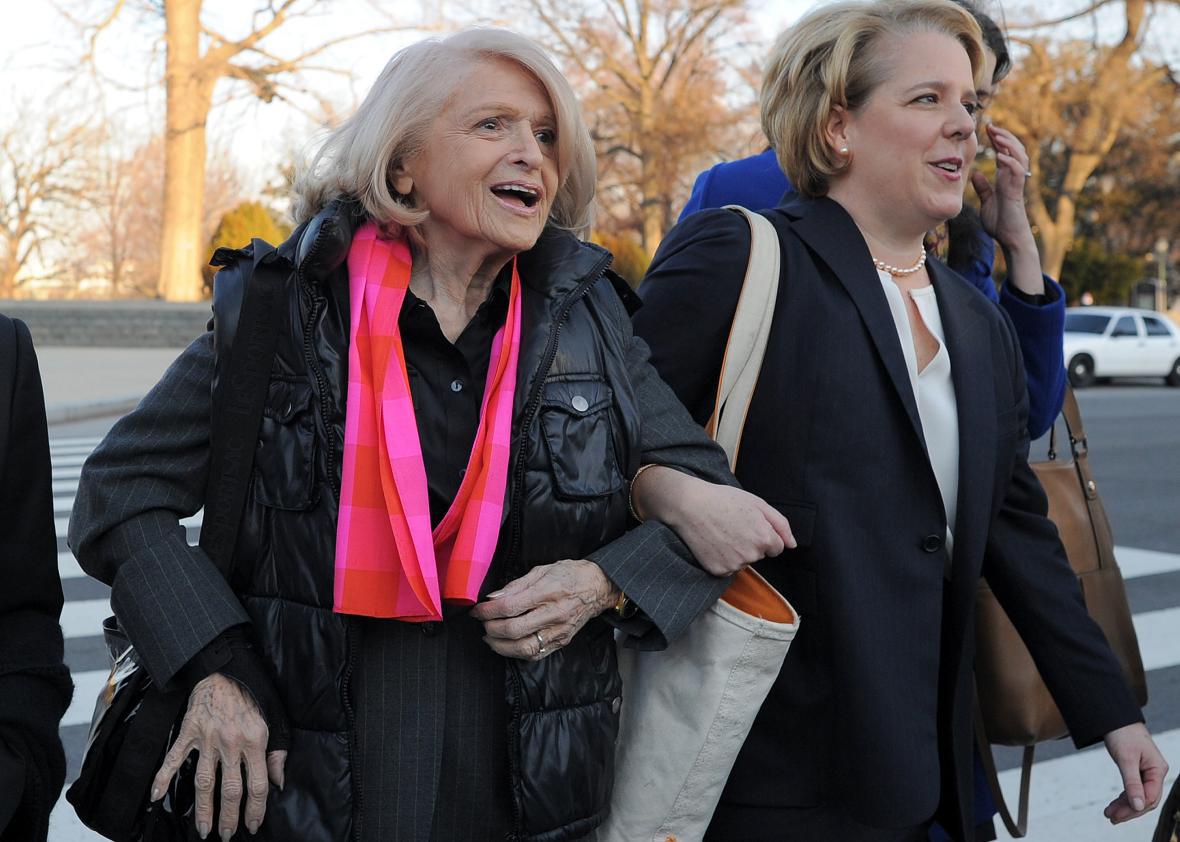Last Friday, nearly 200 demonstrators staged a rowdy protest at Creating Change, an annual LGBTQ conference. The protesters stormed a reception hosted by A Wider Bridge, which connects queer Jewish Americans with LGBTQ Israelis, shouting slogans against Zionism and pinkwashing. Many commenters, myself included, detected in the protest a troubling undertone of anti-Semitism, and the National LGBTQ Task Force, which sponsored the conference, issued a semi-apology.
On Wednesday, the fallout continued when a group of LGBTQ luminaries signed an open letter to the Task Force condemning the protesters’ actions as “extremely dangerous” and “unacceptable.” Roberta Kaplan—lead counsel on United States v. Windsor, which successfully toppled the Defense of Marriage Act—spearheaded the letter. Among its nearly 50 signatories were Evan Wolfson, the marriage equality mastermind; Barney Frank, the openly gay former congressman; Christine Quinn, former speaker of the New York City Council; and Edie Windsor, the Linda Brown of the marriage equality movement.
Naturally, the letter touches on anti-Semitic aspects of the protest, including the reported use of the epithet “kike.” But it is equally concerned with the protesters’ (successful) effort to censor the reception—simply because they dislike Israel. The Task Force, the letter argues, should adopt an “active pluralism” policy with respect to controversial speakers:
Such a policy, while respecting the free speech rights of individuals and groups, would not allow protesters to effectively censor the speech of other groups, much less threaten the physical well-being and safety of those with whom they do not agree, including Jewish and Israeli LGBTQ groups. Given the concentrated and organized hostility that is so often displayed against Jewish and Israeli LGBTQ groups, and the stark rise in global anti-Semitism, it is even more important that we as a community promote civil and respectful debate. It is intellectually, politically and morally dishonest to claim that in the name of freedom, liberation, or some other progressive ideal, there is a right to target and exclude Jewish/Israeli groups, to foment physical intimidation and harassment, and to encourage anti-Semitism.
The letter also explains why censorship should be antithetical to the values of the LGBTQ community:
There is a long and ugly history of this kind of censorship where individuals with controversial ideas and viewpoints have been silenced in the name of the “greater good.” We should know by now that such censorship results in fewer (not more) good ideas and greater (not lesser) oppression of us all. Indeed, given that we come from a movement where LGBTQ people were effectively shut out from participation in the public discourse for so many years, what happened at CC16 was extremely dangerous. If we as a movement really believe in the values we profess to hold dear, then it is time to put an end to this.
Finally, Kaplan et al. call for the Task Force to use an “outside, independent party” to review “what happened, how it happened, and what will be done to ensure that it will not happen again.”
That’s a pretty optimistic goal. I have a queasy feeling that the Creating Change protest represented the beginning, not the end, of a serious rupture within the LGBTQ community. Some members of the community believe that Israel’s humane treatment of LGBTQ people is just a smokescreen to mask its human rights abuses in Palestine—and that any mention of Israel’s pro-gay laws is sheer propaganda. Others believe LGBTQ equality is a normative good that should always be praised—even when pro-gay countries like Israel oppress other minorities.
The latter group can, undoubtedly, collapse into blind Israel boosterism. But the former group, as we’ve seen, risks descending into toxic anti-Semitism. For better or for worse, the clash between these two visions of justice is now an active controversy within the LGBTQ community. What Kaplan and her co-signers have done is draw a line in the sand to denote the point at which anti-Israel sentiment slips beyond the boundaries of acceptable discourse into the dark terrain of anti-Semitic enmity.
